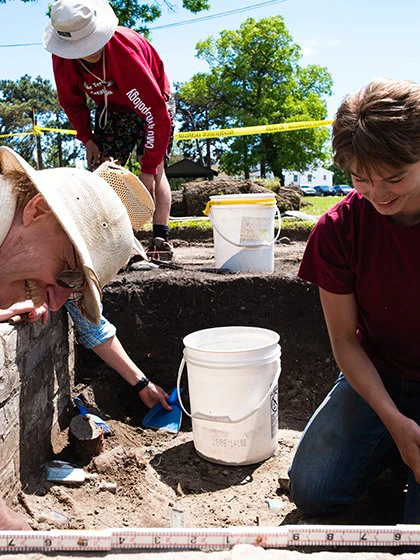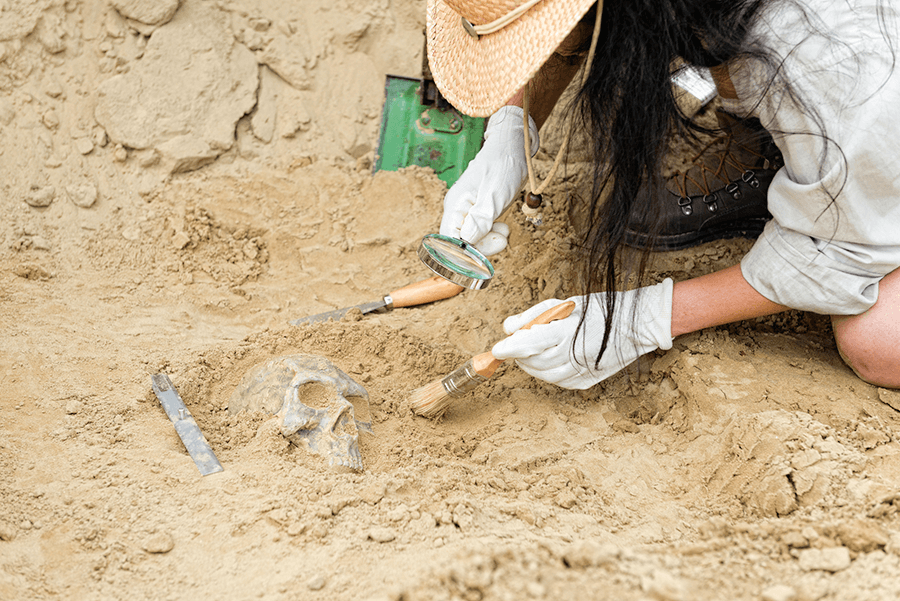


Anthropology
Major, Minor*
Anthropology major
As an anthropology major or minor, you’ll study the people of the past and of the present. From the farthest corners of the world to those in our own neighborhoods, you'll learn to see how the past plays a critical role in the present. You’ll explore the realms of language, culture, biology and history in a quest to understand what it means to be human. This field isn’t just about the past; it’s about how those historical threads create the human diversity of today.
Anthropology majors go on to pursue careers in several different areas, including cultural resource management, global development, law, public health and museum curation. Your understanding of cultural differences and human behavior will prepare you to thrive in diverse workplaces!
AT A GLANCE
Why choose our anthropology major?
All anthropology majors begin their studies in a few important topics. First, you'll explores how ideas in the field have changed over time. Then, you'll take those ideas and uses them to solve social problems by working with communities and organizations. Next, you'll look at different cultures and societies around the world, studying their beliefs, customs and values that influence how people behave and interact. Finally, you'll focuses on the biological and evolutionary parts of being human, like genetics, how we adapt and our connections to other primates.
From there, you will choose a specific track of anthropology to study:
- Human Heritage: With the human heritage track, you'll study areas including education and culture, forensic anthropology, archaeology and human evolution.
- Global Studies: In the global studies track, your studies will touch education and culture, current Native American topics, linguistic anthropology, identity, politics, religion, social change and more. You'll also explore the ethnology of Native North American, Latin America, Africa, South Pacific, Incas and their ancestors.
- Race, Gender and Social Inequities: Studies in the race, gender and social inequities track include world views on sex and gender, medical anthropology, advocacy and essential resources.
You’ll find hands-on, practical experience in our program that will set you up for success in a variety of anthropology jobs. For example, you'll use 3-D printers to create replicas of fossilized human remains dating back some two million years. And you'll learn to locate, excavate and analyze important artifacts at meaningful historical sites. You'll have the chance to study world cultures abroad or even conduct research overseas.
In your anthropology major, you’ll work one-on-one with experienced faculty researchers, activists and authors. Outside the classroom, you'll develop professional skills and make connections through anthropology student groups. These groups are a great way to meet people and discuss projects and anthropology jobs.
Anthropology major highlights
Careers in anthropology
Anthropology jobs can come in all shapes and sizes — including work for security agencies around the world, exhibit design for museums, research for public health agencies and surveying historic sites for local and state governments. The critical thinking and problem-solving skills gained are useful in wide variety of careers.
| Career | Projected Salary |
|---|---|
| Archivist | $57,100 |
| Crime Scene/Forensic Technician | $67,440 |
| Technical Writer | $91,670 |
| Director of Government Affairs | $69,780 |
| Forensic Science Technician | $67,440 |


Anthropology in action
Anthropology majors dive into history with first-hand archaeological fieldwork. Digs at historical sites like the Fort Gratiot Lighthouse and the Mount Pleasant Industrial Boarding School enable students to apply classroom knowledge to real historical sites.
Experiences like these provide valuable training for careers in cultural resource management and enhance appreciation for local history.
Request Information about CMU
By submitting this form, I agree to receive calls, emails and/or text messages from Central Michigan University to discuss furthering my education.